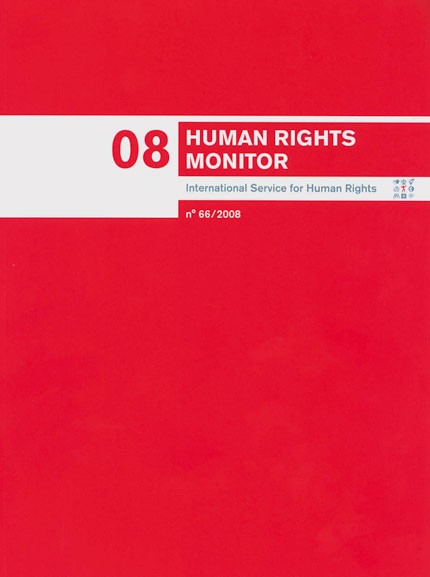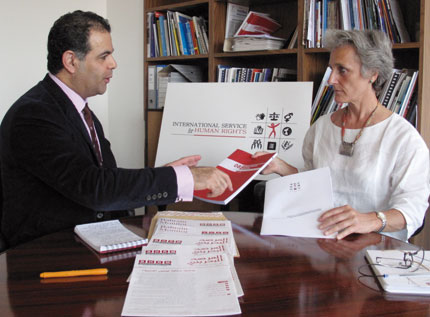
|
 |
 |
|
|
|
|
|
|
|
|
|
|
|
|
|
|
|
|
|
|
|
|
|
|
Isabelle Scherer: We are Ready to Support Human Rights Defenders in the Arab WorldThe International Service for Human Rights (ISHR) is a 25-year old non-governmental organisation based in Geneva that supports human rights defenders in using the UN human rights and regional systems. It puts its decade-long expertise in the UN human rights mechanisms at the service of human rights defenders in the world by providing analytical and practical information, and by training them and national human rights institutions on these systems. The Bahrain Monitor met Isabelle Scherer, Director of the International Service for Human Rights, and interviewed her about a number of issues. Q. What is more concretely your work in Geneva? ISHR monitors all major human rights-related meetings of the UN in Geneva and produces reports and analysis of the debates, developments, and key issues. More specifically, ISHR monitors and reports on all sessions of the Human Rights Council, the Universal Periodic Review and the treaty bodies, namely the bodies that examine States’ compliance with their obligations under human rights treaties. We also follow closely the work of the special rapporteurs and working groups of the Human Rights Council. The UN human rights system may appear complex to outsiders and it is essential that human rights defenders, especially those in the global South, get a clear understanding of the existing standards, the different mechanisms and the key issues being debated at the UN. ISHR plays a major role in providing up-to-date, concise and objective information on all of these points. Q. You use the word “human rights defenders”, but who is a human rights defender? The UN Declaration on Human Rights Defenders gives a broad definition: everybody who, individually and in association with others, promotes and works to protect and implement human rights and fundamental freedoms at the national and international levels is considered a human rights defender. So what matters is the activity of defending and promoting human rights, and not the identity or the profession of the person. It also means that someone who works to promote and protect the right to health, to development, the right of migrant workers, of persons with disabilities, for instance, is a human rights defender. This notion is not restricted to civil or political rights. Q. You say you facilitate the use of the UN system for human rights defenders: How do you do this? Very often, human rights defenders and national human rights institutions around the world would like to engage with the UN system but they don’t know how: they have little information and most of the time little capacity. ISHR organises training courses on the UN human rights system two to three times a year in Geneva, in English or French, for participants from all over the world. The courses
In addition, ISHR keeps a close contact with participants once they are back in their home country and we provide them with all sorts of additional support and advice depending on the needs they express. Q. So, what about the Middle East: Do you provide information in Arabic, do you organise training courses in Arabic in Geneva or in the Arab world? We know that human rights defenders in the Middle East are very keen to receive information on the UN human rights system and on how to use it. However there is a crucial lack of information and capacity and we can see this in our everyday work here in Geneva. ISHR is very well placed to fill this gap. At the moment, most our publications are in English, but we are currently seeking funding to translate key documents into Arabic. As for training courses in Arabic, ISHR is currently seeking funding to implement its new MENA strategy. We wish to provide the same kind of high-quality information and training courses for Arabic-speaking defenders as we do for English or French speakers. In the meantime, I want to encourage more English-speaking human rights defenders from the region to take part in our courses, as was the case recently with a few participants from the region. (To apply to the courses, please see our website: www.ishr.ch/capacity_building Q. Does ISHR have a specific agenda and does it campaign on country situations? ISHR does not have a specific country agenda because it is essentially a service organisation that puts its expertise at the service of all human rights defenders in the world. ISHR played a major role in the process leading to the drafting of the UN Declaration on Human Rights Defenders in 1998 and in the creation of the mandate of the UN Special Rapporteur on Human Rights Defenders, and we have always continued to be very active on this issue that is central to ISHR’s mission. We also do advocacy work to ensure a strong and effective Human Rights Council, for instance, but we do not take positions on the situation of human rights in the world. Q. Do you have activities in the field? We carry out activities in many regions of the world, in particular in relation to regional human rights mechanisms when they exist, as is the case for the African Commission on Human Rights, the Asia Pacific Forum, and the Inter-American Commission. In the Middle East, we have been invited to carry out training courses in the past, for human rights defenders and national human rights institutions, and we are keen to have more opportunities to do this. For more information please see: www.ishr.ch To subscribe to ISHR publications see: www.ishr.ch/subscribe |

